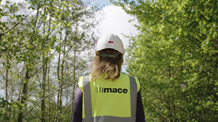No more delays - why it's time to join the fight against climate change
Our industry can be better - but only if we work together. As we come to the end of New York Climate Week, where the world gathers to showcase leading climate action and discuss how we collectively bring about change, it’s clearer than ever that businesses have a responsibility to do more.
The climate crisis can often seem overwhelming. On a regular basis, we hear reports of rising temperatures, natural disasters and devastating human conflict over resources. On top of this, we’re now seeing the very first wave of climate change refugees, with over 10% of the planet’s population vulnerable to extreme weather and rising sea levels.
Global temperatures have increased by over 1.2° C since the age of industrialization and the science tells us if we exceed 2° C, the subsequent damage will be irreversible. But what seems insurmountable can easily be achieved if the burden is shared. We must work together to not only innovate, but also to share the learning and findings we make along the way. Only then can we all keep moving in the right direction, at pace. So no more delays – the time to act is now.
Here at Mace, we’re acutely aware of our industry's impact on the planet and so businesses like ours have huge opportunity to influence - for us this means challenging norms, ourselves and our clients to bring about a brighter tomorrow. Harnessing our unique capabilities to be a force for positive change, we’re committed to working with the supply chain and our clients across the globe to help the industry to do more.
The built environment and its impact
Buildings, construction material and the industry’s related transport are the largest single demand of primary energy use in the world*. And in 2020 alone, there was nearly $400 billion in damage to assets and property in the United States* as a result of natural causes.
So while it’s obvious that we need our spaces to be built and operated in a more efficient manner, it’s also imperative that they are designed and constructed to protect us from natural events. This two-fold mission is just the tip of the iceberg. True sustainability can only be reached if a triple bottom line is met - social benefit, economic benefit, and environmental benefit. But it does instantly raise several questions - is your firm prepared? And where do you begin?
At a minimum, a firm should have a ready understanding of their carbon footprint - because how can you manage what you do not measure? Once you have a core understanding of your impact, you can set targets for improvement. These far-reaching targets must set the benchmark for our industry, address both short-term and long-term action and embed sustainability in every business decision. Employee empowerment should be a centrepiece of these commitments too. When it comes to sustainability, every individual should be given the platform to step up, in order to unlock fresh, ambitious ways of thinking. Big or small, we all have a part to play.
Preparing for the future
These bare minimums will be pivotal in keeping businesses one step ahead of new government legislation. In the US, policies like NYC’s Local Law 97 mean that buildings over 25,000 square feet will be required to meet new energy efficiency and greenhouse gas emissions limits by 2024, with 3/4 of all buildings needing to act to avoid the stricter caps coming into effect in 2030. This policy and others like it are being mirrored in cities across the country but the results of action and inaction alike are being realized globally.
In the eyes of consumers, it’s no longer sufficient for stakeholders to offer a broad statement in support of sustainability. Financiers understand the risks of not planning for climate change, developers understand the challenges of not meeting market best practice in design. So why then does the process continue to be so siloed, when by default it should be comprehensive? Events like NY Climate Week and COP26 are of course, strong steps in the right direction - but there’s still a long way to go. It’s no longer a case of whether we can be sustainable; it’s whether we can afford not to be.
There’s no doubting that the industry is in dire need of an overhaul. We cannot simply do less of everything - we have to find new ways of thinking and working, fast. We cannot reach the goals we have set by making small incremental changes. Instead, we must work hand in hand with emerging technology to not only push the conversation forward, but enable swift action too. That takes collaboration on an epic scale, as well as a refusal to work behind closed doors. This is a fight we’re all in together and we need to open our ears to people at all stages of their careers, of all backgrounds, if we are to have any hope of tackling what is now the defining challenge of a generation. There has never been a more important time to make a difference in the battle against climate change. As we get closer and closer to COP26, the time to act is now.
Source: IEA, Total final consumption by sector, OECD, 1971-2019, IEA, Paris https://www.iea.org/data-and-statistics/charts/total-final-consumption-by-sector-oecd-1971-2019
Source: 2020 U.S. billion-dollar weather and climate disasters in historical context | NOAA Climate.gov











